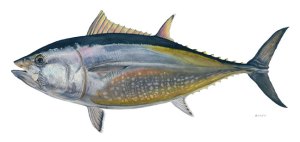One of the world’s largest problems is the fish crisis which I learned about in The End of the Line, a great documentary about overfishing. All over the world, different species have been hunted to very few numbers, and many fish are listed endangered or threatened. Two examples of this major crisis are the problems of the Bluefin Tuna and the Cod.
The Bluefin Tuna can grow up to 12 feet in length, 1,500 pounds in weight and can go up too 25 miles per hour. But now, the Bluefin are facing a major problem- man. Each year, fisherman set a trap in the tuna’s migrating route. Tons of tuna are caught each year- a lot of it illegally.
In a meeting to decide the fate of the tuna, scientists said that 10 tons of tuna would be needed if we want the species to recover. The ministers proposed 29.5 tons, an amount that the tuna couldn’t recover from. The fisherman disobeyed, catching more than 60 tons of fish. That’s more than twice the amount the ministers proposed, and 6 times the amount the tuna needed to recover. In the Mediterranean Sea, companies like Ricardo Fuentes & Sons, Eclofish and other companies form partnerships and purchase Purse Seiners and Spotter planes, specially designed to catch Bluefin Tuna. Mieglo Bregazzi commented in a National Geographic article, “They’re slaughtering everything. The fish don’t stand a chance.”
Purse Seiners are boats with sophisticated radar and net systems, that connect with spotter planes who tell them where there are schools of Bluefin tuna. Not like the Italian government is doing a thing about the planes, even though planes are flying in June, which is illegal.
Another problem was the Cod, a fish that fed the world for centuries, were gone by the 1990s. Industrial fishing had caught tons of cod. Cod fishing is a traditional thing, and villages have a way to do it. They used to cast a line out with as many hooks attached that fit in their boat, but now they are limited to 2,000 hooks, each baited with herring. Even 15-years after cod fishing was banned, the cod still haven’t recovered.
Many spots all over the world have been over-fished – a devastating world catch of about 100 million pounds. Some scientists predict that if fishing rates continue like this- by 2048, all the edible fish in the ocean could be gone.
What would we do without seafood- for example, in Sengal a fish that is threatened is a main food source?
People all over the world are trying to solve this problem- and there right to try. One way to try to save the sea creatures is to create a system like Alaska’s in over-fished spots. Alaska’s system is strict- which I learned about in The End of the Line. Each fishing season, a flare marks the beginning of a mad rush in fishing, and people monitor boats strictly to keep them inside the fishing radius. Another way is to create marine reserves for threatened and endangered marine animals/plants. Mankind must slow down on their fishing- our entire communities could starve.
Cool Links for More Information:
- The End of the Line – official web site
- National Geographic– Global Fisheries Crisis Article
- ICCAT – International Commission for the Conservation of Atlantic Tunas


You are so right, Smart Being. Those of us who can afford to cut our consumption should do that so that those who rely on these fish for the main part of their diets won’t starve. We also need to use the considerable strength the United States brings to the table to encourage countries to make strong rules and enforce them. It’s not enough to move the fish into “farms”, they need their habitat.
Fish do powerful work keeping the ocean clean. Without them, we would lose much more than only a food source.
By: Peggy on November 24, 2009
at 1:13 am
This is a powerful blog post, friend.
I hope you will keep blogging to keep us informed of good media sources and the state of our environment.
Is it true you are only 10 years old?
Wow.
Rob Williams
(A friend of your Dad’s)
By: Rob Williams on November 27, 2009
at 4:25 pm
Thanks for teaching me about the crisis that these fish are facing. I know a little about swordfish fishing, but I didn’t know about what’s been happening to bluefin and cod. I look forward to learning more from you. Let’s talk about how you might incorporate your interest and research into a school project – if you’d like.
By: Carol Johnson on November 29, 2009
at 1:39 am
Peggy: I agree with you after researching about fish. Fish play an important part in the ocean, and are key parts of some peoples diets, so we should work hard to help the underwater species.
Rob: Thank you for the comment, and I’m going to continue writing about different environmental and man-made problems.
Carol: Thank you, it was a lot of fun researching and writing about the fish crisis, so I would be welcome to discuss about incorporating it into a project.
By: azurejello on November 29, 2009
at 7:18 pm